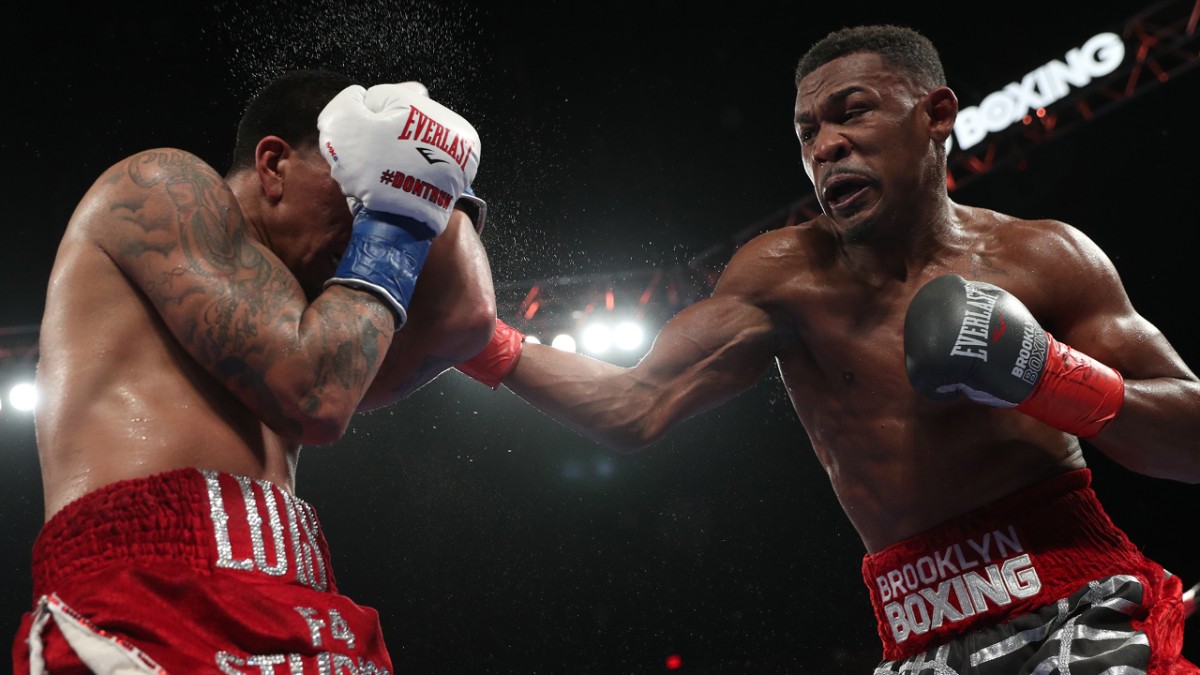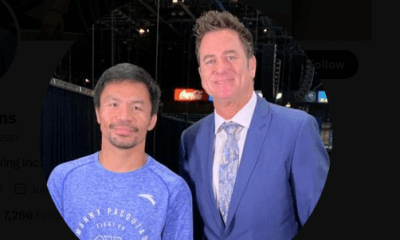Featured Articles
Sunday Report Card: The Ultimate Weekend Wrap-Up (Nov. 12 edition)

Sunday Report Card – The Sweet Science’s Diego Morilla compiles a full weekend wrap-up of the most relevant boxing events in the worldwide scene with short recaps, links to videos and other articles, and all the info you need to keep up with the week’s most important results. Every fight that matters is right here, in one place, and at one click away. Follow us every Sunday on Twitter at #SRC @TheSweetScience @MorillaBoxing
Uniondale, N.Y., Saturday, November 11
Daniel Jacobs UD 12 Luis Arias, middleweights
“The Miracle Man” is back, indeed. But his performance was not the spectacular return that we all hoped for after his career-best performance in his fight against Gennady Golovkin back in March. This time, he started with a bang by putting Arias (18-1, 9 KOs) in trouble early on, keeping the Cuban-Nicaraguan fighter in check and forcing him to clinch and avoid an early knockdown, and that recipe was repeated for pretty much the entire fight, with Arias in survival mode and Jacobs exploding in bursts of frustration occasionally, trying desperately to inflatable slide score a stoppage that never came. Jacobs was credited with a flash knockdown in the eleventh, but never really had the previously unbeaten Arias in danger as he cruised to a 118-109, 120-107 and 119-108 decision win that puts his record at 33-2 with 29 knockouts.
The winner goes on to: It shouldn’t be hard to lure a top contender into the ring with Jacobs after such a not-so-explosive performance, but his sights are set on an eventual bout with the winner of GGG-Canelo II, so I guess an interim bout with a David Lemieux type would be the advisable move.
Read a full recap of this fight here at TheSweetScience.com.
Jarrell Miller TKO 9 Mariusz Wach, heavyweights
“Big Baby” Miller (20-0, 18 KO) stayed unbeaten with this entertaining (OK, I had very low expectations and they were almost fulfilled, OK?) bout against the towering Wach (33-3, 17 KOs), a former world title challenger from Poland who never showed any arguments to dispute Miller’s aggressiveness in the ring. Apparently, Wach broke his hand sometime during the fight, and therefore lost all the limited pop that he had, so my guess is that Miller sensed that deficiency and went all-out knowing that he couldn’t be hurt by Wach, bobbing and weaving his way in and exposing himself to Wach’s now harmless punches until the inevitable stoppage happened.
The winner goes on to: Not a bad performance by Miller, but the “next level” should be considerably more difficult for him. Even someone as limited as Dominic Breazeale could be too big a hurdle for him.
Cletus Seldin TKO 3 Roberto Ortiz, junior welterweights
Well, I guess “The Hebrew Hammer” proved us all wrong, didn’t he? Seldin (21-0, 17 KOs) was seen as a largely unproven fighter, but he dismissed those thoughts with an impressive annihilation of Ortiz (35-2-2, 26 KOs), a tough hombre who had only been stopped by Lucas Matthysse. A mere 30 seconds into the bout, Seldin dropped Ortiz with a right hand and sent him down a second time a short time later, continuing his assault in the following round and opening a cut over Ortiz’s left eye. Finally, the referee considered he had seen enough and stopped the carnage towards the end of the third round.
Fresno, California, Saturday, November 11
Jose Ramirez TKO 2 Mike Reed, 10 rounds, junior welterweights
The “Fight for Water” had us all gasping for air in the end, instead. Ramirez (21-0, 16 KOs), local hero, unbeaten, 2012 Olympian, and community activist in this agricultural area of California, labeled the bout as “Fight for Water” to honor the area’s complaints about water usage in the region. And he then honored his pledge to give his hometown fans a huge victory by destroying then-unbeaten Reed (23-1, 12 KOs) in just two rounds in front of a huge crowd. A demolishing knockdown in the second round set the tone for the stoppage, which came midway through the round amid pointless protests by the seriously outgunned Reed.
Artur Beterbiev TKO 12 Enrico Koelling, vacant IBF light heavyweight title
Beterbiev (12-0, 12 KOs) is making his case to become the next big KO artist from the former Soviet block, and he took a major step in this title-winning performance against a game but outgunned Koelling (23-2, 6 KOs) to claim the vacant IBF world title left behind by Andre Ward. True to his nature, Beterbiev moved in for the kill from the very beginning while Germany’s Koelling tried to hold him off and outbox him, to no avail. The Russian powerhouse then decided to pick his spots and turn the fight into a progressive destruction effort, and he had his reward when there were less than 30 seconds left on the clock to finally lift his first title belt and initiate a championship run that could turn him into one of the most attractive fighters in the heavier divisions in the near future.
Also on this card:
Amir Imam TKO 4 Johnny Garcia, junior welterweights
Alex Saucedo KO 3 Gustavo Vittori, junior welterweights
Edinburgh, Scotland, Saturday, November 11
Josh Taylor KO 9 Miguel Vazquez, 12 rounds, junior welterweights
Nice win for the 26-year old Taylor (11-0, 10 KOs), who became the first man to stop the superbly technical and extraordinarily boring Vazquez in his 45-fight career (39-6, 15 KOs) with a right hook to the body. Vazquez, a veteran of many a Top Rank undercard during his four-year reign of tedium, still has all the technical ability that drove him to the championship but he is now in fringe contender/steppingstone territory, in stark contrast with Taylor’s young march towards higher ground.
The winner goes on to: Taylor, trained by Shane McGuigan, has his work cut out for him in one of the toughest divisions in boxing, but if he can continue luring top names into his hunting grounds in the Highlands he is in good shape to build a resume strong enough to secure a title shot within two years or less.
Newcastle, England, Saturday, November 11
Liam Smith UD 12 Liam Williams, junior middleweights
Not so much controversy this time, huh? Their first “Battle of the Liams” ended in controversy after a clash of heads caused Williams to withdraw and thus forfeit the fight to Smith, renewing a bitter feud between both fighters that promised to end in this rematch, which was also a WBO title eliminator to boot. In the end, it was Smith (26-1-1, 14 KOs) who was able to settle the score, this time with a majority decision over Williams (16-2-1, 11 KOs) by scores of 117-111, 116-112 and 114-114, in a fight that clamors for a third episode – perhaps with a world title belt on the line next time.
Bilbao, Spain, Saturday, November 11
Kerman Lejarraga UD 10 Jose del Río, Spanish welterweight title
At first look, a Spanish welterweight title shouldn’t be something to write home about, right? Well, this time it kinda is. Lejarraga (24-0, 19 KOs) is a legitimate blue chip prospect generating lots of interest in the Spanish peninsula, and this fight is a testimony of that since it was the main event of Spain’s first-ever Pay-Per-View card. That was also in part thanks to Del Rio´s popularity as well, but it is clear that Lejarraga is the man to follow here. The card was called the “Night of the Million” in reference to the amount of people who were expected to tune in and probably the amount of money expected to be collected, and over 10,000 souls packed the local arena to witness the event. It is time to make Lejarraga move his act stateside and start putting new numbers in his record. The final ones for this night were given by the three scorecards of 99-90, 98-92 and 99-91 in favor of the “Revolver of Morga” over Del Rio (26-6, 7 KOs).
Cleveland, Ohio, Friday, November 10
Yuandale Evans SD 10 Luis Rosa, featherweights
We’re talking real fights here. Beautiful stuff by Evans (20-1, 14 KOs), who did everything he could to avoid being the only once-beaten fighter in the ring that night and handed Rosa (23-1, 11 KOs) his first career loss after 10 stupendous rounds of action. The fight went back and forth and both fighters seemed on the verge of scoring a stoppage at certain points of the fight, with Rosa being closer to that goal in the fateful 8th where he rocked Evans into a corner. The tenth and final round was as emotional as it could get, with both fighters continuing to trade unpleasantries well after the final bell sounded as an early call for a rematch, which given the close scorecards (96-94 and 96-93 for Evans, 96-94 for Rosa) is very possible.
Read a full recap of this fight here at TheSweetScience.com
Radzhab Butaev UD 8 Janer Gonzalez, welterweights
Not a very emotional fight, but a great display of boxing skills by Butaev (8-0, 6 KOs), who continued his unbeaten march at the expense of Gonzalez’s (19-1-1, 15 KOs). The Russian former amateur star was wise enough to put rounds in the bank early on and then tough enough to weather the late surge from his Colombian foe, finishing ahead by scores of 80-72, 79-73, 77-75.
Photo credit: HBO Boxing
Sunday Report Card / Check out more boxing newson video at The Boxing Channel.
-

 Featured Articles3 weeks ago
Featured Articles3 weeks agoVito Mielnicki Jr Whitewashes Kamil Gardzielik Before the Home Folks in Newark
-

 Featured Articles4 days ago
Featured Articles4 days agoResults and Recaps from New York Where Taylor Edged Serrano Once Again
-

 Featured Articles1 week ago
Featured Articles1 week agoFrom a Sympathetic Figure to a Pariah: The Travails of Julio Cesar Chavez Jr
-

 Featured Articles3 days ago
Featured Articles3 days agoResults and Recaps from NYC where Hamzah Sheeraz was Spectacular
-

 Featured Articles4 weeks ago
Featured Articles4 weeks agoCatching Up with Clay Moyle Who Talks About His Massive Collection of Boxing Books
-

 Featured Articles1 week ago
Featured Articles1 week agoCatterall vs Eubank Ends Prematurely; Catterall Wins a Technical Decision
-

 Featured Articles4 days ago
Featured Articles4 days agoPhiladelphia Welterweight Gil Turner, a Phenom, Now Rests in an Unmarked Grave
-

 Featured Articles3 weeks ago
Featured Articles3 weeks agoMore Medals for Hawaii’s Patricio Family at the USA Boxing Summer Festival



















